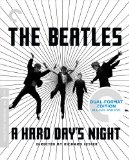| Reviews & Columns |
|
Reviews DVD TV on DVD Blu-ray 4K UHD International DVDs In Theaters Reviews by Studio Video Games Features Collector Series DVDs Easter Egg Database Interviews DVD Talk Radio Feature Articles Columns Anime Talk DVD Savant Horror DVDs The M.O.D. Squad Art House HD Talk Silent DVD
|
DVD Talk Forum |
|
|
| Resources |
|
DVD Price Search Customer Service #'s RCE Info Links |
|
Columns
|
|
|
Hard Day's Night, A
Beatlemania runs wild again
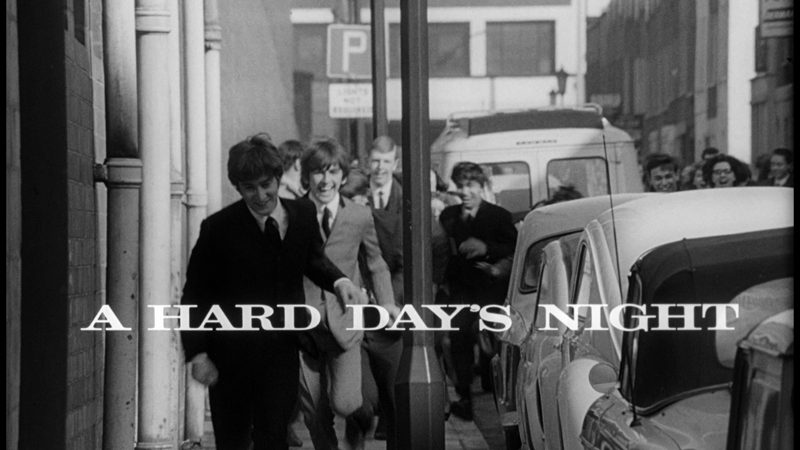
Loves: The Beatles, Criterion
Likes: Jukebox musicals
Dislikes:
Hates: Missing out on extras
The Movie
From the moment of the first guitar twang of the theme song from A Hard Day's Night, you know you're in for something exciting. That it's followed by a wild chase scene, in which a pack of rabid teenagers chase the Fab Four through the streets cements that this is a movie in motion. But after the Beatles are safely aboard a departing train, things calm down considerably, with John, Paul, George and Ringo taking their seats for a relaxing ride. It's then that the fun really starts, as the quartet start slinging quips and cracking jokes (about each other and the little old man, Paul's Grandfather, who has joined them on the trip.) Soon they find themselves sparring with an upper-crusty gentleman, and they can take their proper spot as heroes of the young.
The Beatles are so established in culture, with so many personas, including their most recent psychedelic stage, that sometimes it's easy to forget they were once fresh-faced young men. A Hard Day's Night which follows a fictionalized day in their lives, as they prepare for and perform for a television program and an audience of screaming fans, captures that essence, and, in the process, captures an incredibly funny group of lads who are willing to be a bit absurd at times. While it was scripted (earning an Oscar nomination) the natural ability of the Beatles to just be themselves served them well in crafting these on-screen characters, be it the smart-ass John, the good-guy Paul, thoughtful, yet silly George and the runt of the litter, the sensitive, book-reading Ringo.
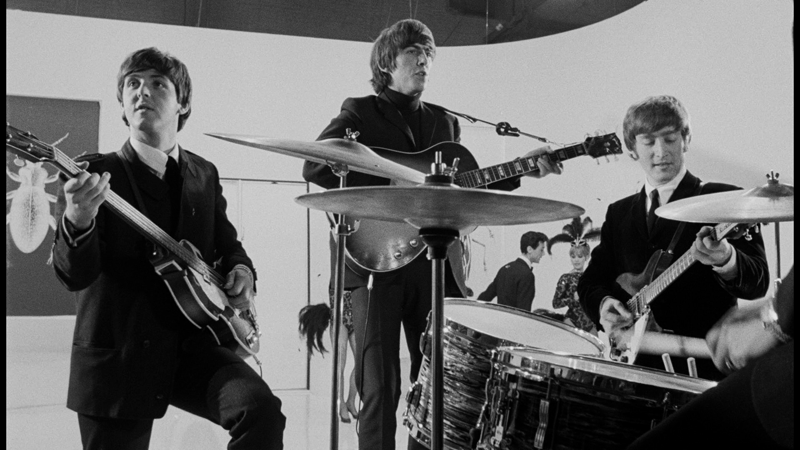
The Beatles get a challenge for the title of star of the show though in the form of Wilfred Bramble, who, as Paul's Grandfather, gets into a mess of trouble at every turn. Though it's evident in many places, it's with the grandpa that director Richard Lester's appreciation for silent comedy shines through. One scene, where Grandfather fakes being a waiter in order to steal a tip, is shot and played in such a way that it could have been Harold Lloyd himself in front of the camera. It's through Grandfather that the plot (what there is of one) progresses, making his schemes integral to the movies.
Naturally, since this is a Beatles movie, there's got to be music, and there is, with seven classic songs, including the title song, "I Wanna Be Your Man" and "Can't Buy Me Love," along with a number of strong ballads, like "And I Love Her" and "If I Fell." By building the film around a performance, which allows for rehearsals and soundchecks, the music doesn't feel particularly forced, with only one song wedged in at all.
However, the performance at the end, which captures the feel of a chaotic concert free-for-all impressively, features five straight songs, all of which have been heard in the film at this point. I love the Beatles, but after so much fun watching them be themselves, this much straightforward stage performance becomes overkill, and drags down the momentum at a point where it really should be hitting a crescendo. It honestly feels like padding in a movie that is otherwise slim and trim (even if some of the goof-off scenes could have been shorter while accomplishing the same effect.
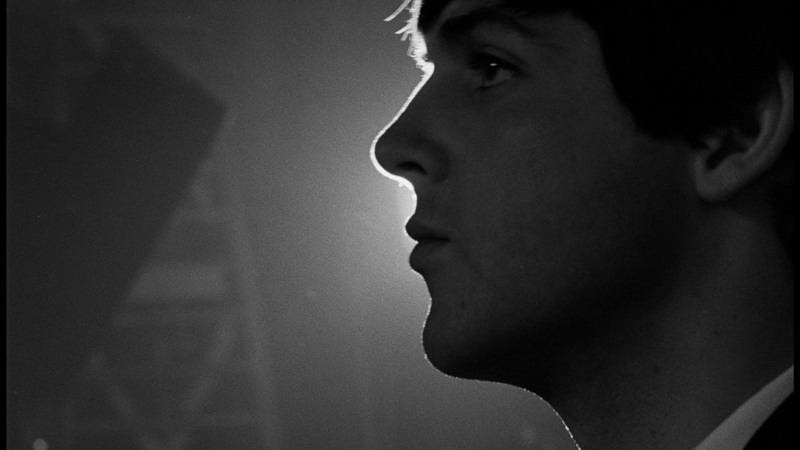
The Disc
A Hard Day's Night arrives in another of Criterion's soon-to-be-extinct dual-format releases, a three-disc set (one Blu-ray, two DVDs) packed in an attractive, graphic two-tray digipak with a thick 82-page booklet, all held in a matte-finish slipcase (which reveals an image of screaming fans on the inside when the digipak is removed.) Criterion's wonderful Blu-ray menu system sits over footage of the film's musical scenes, with options to watch the movie, select scenes, listen to the audio commentary, check out special features and adjust the audio. Audio options include English DTS-HS Master Audio 5.1, LPCM 2.0 and LPCM 1.0 tracks, while subtitles are available in English SDH.
The Quality
When Criterion's description of the transfer effort takes up a full page of the booklet, you know it's something special. The 1080p, AVC-encoded transfer checks in at 1.75:1, and was crafted from three original sources with Lester's approval, followed by a detailed clean-up performed on a 4K transfer. The results are outstanding, with the black and white image looking sharp and clean, to the point where it's hard to believe it was captured on the cheap decades ago. A grainy film to begin with, this transfer thankfully doesn't lose that aspect, yet the whole thing feels brighter and crisper, with far better contrast than ever before. To top it off, it's a technically flawless presentation, with no concerns about digital distractions.
Just as with the video, the audio has an extensive history in the booklet, as one would expect from anything involving Abbey Road Studios, not to mention the BFI. Several groups brought together a variety of sources to piece together a premiere audio presentation, and the results are fantastic, whether you're listening to the strong original mono or one of the mixes provided. The mono captures the film's original feel (like the mono bootlegs of the Beatles' music I may have heard somewhere) with everything sounds bold and clear (George's eating is particularly present at one point.) The 5.1 track, which I normally avoid on films originally presented in mono, benefits from being pulled together by Abbey Road producers and engineers, and the music sounds amazing, using the surround speakers optimally, without sounding artificial. Somehow more impressive than the music are the screams of the Beatles' fans. You can easily pick out individual voices in the whirlwind, which is amazing to hear.
The Extras
Several of the extras found on the previous DVDs did not make their way onto this set, at least in their whole form. A few of them really were interesting, especially Sir George Martin's song-by-song evaluation of the soundtrack, but the extras here are impressive nonetheless. Up first is a full-length group commentary track, cobbled together by Beatles historian Martin Lewis, from recordings in 2002, with 15 participants, including actors Anna Quayle, John Junkin, David Janson, Lionel Blair, Terry Hooper and Jeremy Lloyd, DP Gilbert Taylor, associate producer Denis O'Dell, second assistant director Barrie Melrose and editors Pamela Tomlin, Jay Benson, Gordon Daniel and Jim Roddan. With so many participants, it gets confusing as to who's who, but there are a lot of production details shared, along with some amusing anecdotes about the budget and trying to shoot in public with such a famous band, with O'Dell taking on something of a lead role. A few of the participants seem to have been recorded together, as they react to each other, avoiding the "all alone together" sense many edited group commentaries suffer from.
Produced by Beatles historian Martin Lewis, "Things They Said Today" (36:18) is carried over from the 2002 Collector's Edition DVD, and includes interviews with Lester, Martin and several members of the cast and crew. The history of the film's production and thoughts on the finished product are the focus here with these smoothly flowing, if somewhat low-key retrospective interviews.
A 1994 documentary hosted by Phil Collins (who actually was an extra in the film), "You Can't Do That: The Making of A Hard Day's Night" (1 hour, 2 min.) celebrated the film's 30th anniversary by gathering much of the cast and crew to get their thoughts, along with Roger Ebert, fans of the film and musicians like The Monkees' Micky Dolenz and Roger McGuinn of The Byrds. Though it's aged a bit in terms of the presentation, the testimonials are enjoyable, and it's always nice to hear from Ebert (as well as the recording of Harrison.) As a bonus, an outtake performance, of the song "You Can't Do That" is included.
The Beatles are not really a part of these extras in any real way, which is why "In Their Own Voices" (18:02) is such a welcome addition. Pulled together from various audio interviews about the film, this featurette lays the sound of the Beatles discussing A Hard Day's Night over behind-the-scenes footage and still photography, in order to give a bit of their perspective. Ever charming, the best part is likely where they talk, somewhat defensively, about the use of the word "cheeky" in the film.
New to this set is "Anatomy of Style", a 17:07 examination of the film's style by story editor Bobbie O'Steen and music editor Suzana Peric. Looking ar five iconic scenes from the movie, they get in-depth about the construction from a cinematic perspective, discussing camera work, editing and music, and the effect that's achieved. After watching the movie, you're sure to appreciate the quality, but this featurette helps you understand why you appreciate it.
"The Beatles: The Road to A Hard Day's Night" (27:41) is a newly-shot sit-down with The Beatles: All These Years, Volume 1--Tune In author Mark Lewisohn, that's supplemented by clips and plenty of archival photos. This one is all about the history of the Beatles in the years leading up to A Hard Day's Night. For hardcore fans, this may be stuff you already know, but it's a fine overview of the emergence of one of the history's greatest bands (including their "interesting" fashion choices and how Pete Best became an ex-Beatle.)
Though A Hard Day's Night is obviously the Beatles' film, Lester gets some spotlight as well here in the bonus features, first with his short film The Running Jumping & Standing Still Film (11:10). Shot in 1959 with his Goon Show collaborators Spike Milligan, Peter Sellers, Graham Stark and Bruce Lacey, this wordless Oscar-nominated film is far simpler than anything he would do just four years later, though it has the idea of linked sketches that would become integral to Monty Python and sketch films for decades to come. Is it very funny? No, not really. But it is historic.
Criterion commissioned critic David Cairns to create "Picturewise" a 27:12 visual essay on Lester's influences and the influences he's had on others. A very academic piece, it breaks down nine reasons why Lester was the right choice to direct A Hard Day's Night, with clips of Lester speaking providing his input. Though formally structured, the info will be of value to anyone with an interest in film, as it moves through Night to The Knack and How to Get it, Help, How I Won the War and his Superman films, as well as the results that followed, like The Monkees.
Also included on the disc are some trailers, for the 2000 re-release and the 2014 re-release. Some original trailers, like those seen in pieces throughout the rest of the extras would have been ideal though. The 2000 trailer, from Miramax, goes for the hard-sell via obnoxious voiceover, claiming that the "digitally-restored soundtrack" is better than the original, while the 2014 version, courtesy of Janus, sticks to clips and music, capturing the film's feel.
Criterion's Blu-ray booklets have been great, and this one is no different, clocking in at a whopping 82 pages. Aside from the usual info about the release, including rather extensive notes on the transfer and audio, this booklet includes two portions (along with plenty of photos.) First up is "The Whole World is Watching", an essay by critic Howard Hampton that explores the film in cinematic terms, including how Lester approached the film. Then, in the more extensive second half, "Richard Lester on the Making of A Hard Day's Night" provides a streamlined version of a 1970 interview with Lester (by J. Philip DiFranco.) This in-depth chat, spurred by photos and other ephemera they had in front of them, is wide-ranging, moving from what it was like to work with the Beatles, to technical details about his shooting style to personal notes, like his adoration of Buster Keaton (which explains plenty about much of the film at hand.)
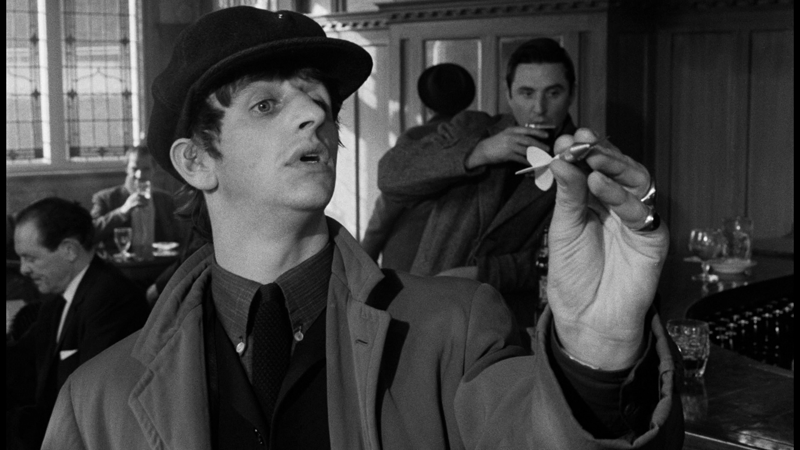
The Bottom Line
A Hard Day's Night is a timeless burst of energy in cinematic form, delivering fun in both the comedy and the music. The greatest music film ever, it thrives mainly on two elements: the delightful personalities and chemistry of the Beatles and the stylish filmmaking effort led by Lester. Together, they created a breezy film that doesn't even require you to like their music to enjoy (though if you do, it's a fantastic experience.) Criterion has delivered a tremendous package here, paying special attention to the audio, while loading the set with extras (even if some of the material from previous releases is not included.) For a Beatles fan, this is one you must own, while everyone else owes it to themselves to revisit the film (or, if lucky, discover it for the first time.)
Francis Rizzo III is a native Long Islander, where he works in academia. In his spare time, he enjoys watching hockey, writing and spending time with his wife, daughter and puppy.Follow him on Twitter
*The Reviewer's Bias section is an attempt to help readers use the review to its best effect. By knowing where the reviewer's biases lie on the film's subject matter, one can read the review with the right mindset.
|
| Popular Reviews |
| Sponsored Links |
|
|
| Sponsored Links |
|
|
| Release List | Reviews | Shop | Newsletter | Forum | DVD Giveaways | Blu-Ray | Advertise |
|
Copyright 2024 DVDTalk.com All Rights Reserved. Legal Info, Privacy Policy, Terms of Use,
Manage Preferences,
Your Privacy Choices | |||||||









